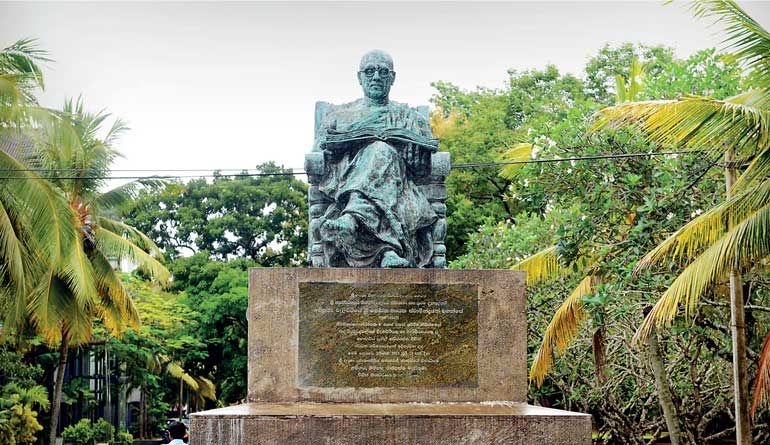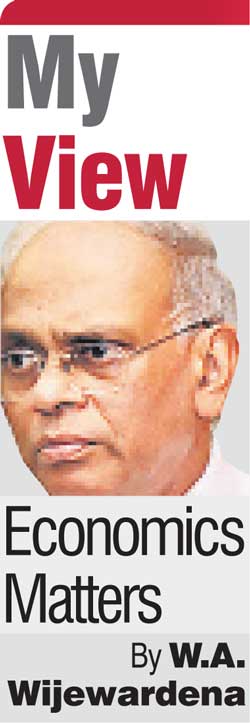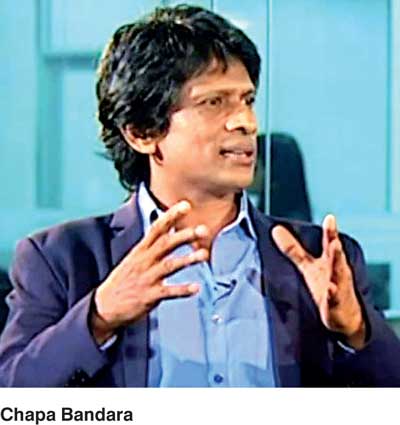Sunday Feb 22, 2026
Sunday Feb 22, 2026
Monday, 5 February 2018 00:00 - - {{hitsCtrl.values.hits}}

Weliwitiye Sri Soratha Thero
In the previous part of this series (available here), we presented the wisdom of the President of Thailand based Asian Institute of Technology or AIT, Professor Worsak Kanok-Nukulchai, how the intellectuals in Thailand should be groomed for an unknown future marked by an exponential growth in technology. Worsak made his thoughts known in a lecture delivered to the fellow members of the Royal Society of Thailand or RST, the think-tank that advises Thai Government on policy matters.
The world view presented by Worsak was that the students in the present generation are savvy in digital technology and therefore could be branded as ‘digital natives’. They have started questioning the modus operandi of delivering knowledge in traditional classrooms in which they have to listen to a teacher, take down notes, memorise them and show their understanding of the subjects concerned at tests administered to them at the end.

The current advancements in technology have unified people and what we observe today is the emergence of global citizens, an evolution from the present state of being digital natives. Since knowledge is out there for anyone with technology to access freely, the monopoly power held by traditional teachers is fast eroding. Hence, educators today have to use new techniques of teaching, like the flipped classroom in which learning is a joint exercise by teachers who are just facilitators and students, the recipients of knowledge. What he has implied was that universities will have to give a wider world outlook to their students to prepare them for the unknown future. He has warned that any university that does not recognise this change will become extinct in the future.
USJ’s guest lecture series to give practical knowledge to students
The Faculty of Management Studies and Commerce of the University of Sri Jayewardenepura, known as USJ, in an attempt to expand the world outlook of its students had arranged two guest lectures by journalist and human resource consultant Chapa Bandara, one in the morning and the other in the afternoon, to its first year students following macroeconomics. The morning lecture could be accessed at https://www.youtube.com/watch?v=2U9cDEbt3WY&t=2047s, and the afternoon lecture at https://www.youtube.com/watch?v=vS9CSft8qxI&t=274s.
When introducing the guest lecturer, the Head of Business Economics pronounced that the objective of the lecture series was to help students to gain practical knowledge on current economic issues. It is learned that they had been addressed by economists from the Central Bank and the Ministry of Finance previously under the same series. Calling Chapa who was not a mainstream economist or an economic practitioner would have been to give a different taste to these students. Hence, he was expected to review the present state of the economy and future economic strategies from a different angle.
Chapa: An unconventional intellect
Chapa’s fame as a popular public speaker would have travelled to USJ before him, for the auditorium at the Soratha Building had been full to its capacity with teeming students. This is certainly an exception since the rule at the university has been for students to shun lectures, especially the additional lectures that do not help them to pass examinations. Chapa had brought his technical team from Channel 4 to record the proceedings; unlike the previous lectures in the series, the videos are now available on YouTube for anyone to learn of his wisdom.
Both lectures were long, running into more than one hour. When the camera was directed to students from time to time, their faces showed that they were attentive and fully connected to the speaker at the podium for the whole duration. This is contrary to what Salman Khan of Khan Academy fame has observed in his 2012 book ‘The One World School House’. He says that if a lecture runs longer than 15 minutes, the lecturer loses the attention of the audience.
There were two other distinguishing features of Chapa’s presentation. One was that though he was introduced in English, he chose to speak in Sinhala, presumably to convey his message more cogently to students who were not that competent in the language. The other was that he did not use a PowerPoint presentation to elaborate on what he said. This is in line with the thinking of the man behind the Apple products, Steve Jobs, who, according to his biographer Isaac Waterston, had believed that those who hid behind PowerPoint presentations did not know their subject or could not explain themselves. Chapa did not fall into these disabilities.
Wisdom of the founder of the university
The lecture had been held at Soratha Building, named after the founding Vice Chancellor of the predecessor to USJ, the Vidyodaya University, Rev. Weliwitiye Sri Soratha Thero. A visual of the statue of Rev Soratha Thero erected in front of the Faculty building had been captured by the Channel 4 team. It is not known whether the Faculty had advised the students listening to Chapa that they should take what he said in the frame of an intellectual as defined by that erudite educator. Soratha Thero had advised that university students who would one day become intellectuals should challenge what is told to them, probe into evidence in support or against and take a critical stand of their own. This is the foundation of scientific learning and it requires students not to take everything they are told at their face value.

Chapa’s political economy
Chapa has started his presentation by asking two questions: what is an economy and what is development. He answered them for the students by identifying the link between the two and the global politics that rules them. This is looking at economics from the old political economy perspective that had helped the subject matter of economics to evolve into what it is today.
Even at the time of Kautilya, the 4th century BCE Indian Guru of economics of the Arthashastra fame, economics, politics, warfare, laws, diplomacy, trade, social issues and public administration had been combined in a single discipline called Arthashastra or economics. What Chapa had tried to drive into students has been that the global economy is ruled by USA, an evil empire in today’s context. What USA has done since the World War II in its relations with the rest of the world and its pronounced schemes for the future support of Chapa’s position. However, his implication that USA has always been the winner and the rest of the world the loser is not accurate.
‘We’ and ‘They’ distinction
Chapa’s classification of the world into ‘We’ and ‘They’ is not a new phenomenon. As Yuval Noah Harari has documented in his 2014 book ‘Sapiens: A Brief History of Humankind’, even the hunter gatherers some 10 to 60 thousand years ago had looked at those who do not belong to their hunting clan as enemies. They are not ‘We’ and, therefore, they should be destroyed was their sacred belief.
This classification has been practised religiously by Homo sapiens even as agriculturists since 10000 years ago, as industrialists since some 200 years ago and as digital natives today, a term coined by Worsak to describe the tech savvy youngsters of the day. One has to look at the postings made on social media by various individuals to find evidence for this ‘We’ and ‘They’ classification. Such classification is anti-human and tribal in nature; it is unfortunate that even the followers of the Buddha who had viewed humans as humans are not free from such tribalistic view points.
Is USA an enemy?
Now back to Chapa’s allegation that the relations which USA has had with the rest of the world has been a one-way pipe benefiting only Americans. Since USA is ‘They’ and a powerful ‘They’ in a position to dictate terms to others for that matter, it is not unusual for a critique to form that opinion. The hegemonic statements made by successive US leadership have also reinforced this view. This is specifically true with Donald Trump administration which practices ‘We’ and ‘They’ classification to an extreme degree. Apart from these obvious negative scores earned by USA, its relations with the rest of the world since World War II have not necessarily imposed costs on others.
USA, the supplier of reserve currency
By the time the World War II ended, the world was without a foreign reserve currency to do transactions with each other. The currencies of individual countries were not acceptable since they had not been backed by any valuable asset like gold. In this background, USA agreed to allow the US dollar as the reserve currency on the promise that it would exchange dollars for gold at a fixed price of $35 per fine ounce of gold, known as the Gold Exchange Standard.
This promise gave confidence for other nations to accept and use US dollar as a reserve currency. Even after the unilateral withdrawal of USA from the Gold Exchange Standard in August 1971, the world continued to accept US dollar as the reserve currency because it was still backed by an 18 trillion dollar economy with gold holdings to cover about 70% of the dollars issued.
Today, the dollar has unified the world including those who are opposed to USA. For instance, North Korea is dead against USA. But it still loves US dollars. The availability of dollars has supported the world trade and transactions without any hindrance and it will continue to do so until a new reserve currency is discovered by the world.
USA, the largest buyer in the globe
USA has also helped the rest of the world to grow by buying their products continuously. This it has done by running a deficit in its trade account. Accordingly, a deficit in US trade account means a trade surplus for the rest of the world. The countries which had been able to jump this bandwagon, especially the post-war Japan, Singapore, South Korea, Taiwan and China in this region, have been able to grow faster and deliver prosperity to their citizens. Even Sri Lanka runs a trade surplus with USA. Imagine what will happen to Sri Lanka’s income, employment, and prosperity if USA does not buy its apparel products.
USA, the industrial power house
USA is also the world’s industrial, technological and innovative powerhouse which has helped the rest of the world to enjoy a better living standard. Its universities come up with thousands of new inventions annually and those inventions are transformed into viable commercial products by its services sector. This has also helped the rest of the world to revolutionise their education systems. South Korea, Singapore and Thailand are some examples.
Win-win situations in global relations
The world relationships are not simply black and white as Chapa has informed the USJ students. They are two way relationships in which both parties gain. Chapa’s position has been that it is ‘win’ for USA and ‘lose’ for the rest of the world. This is how it appears if one looks at only the surface. However, if one goes deep into them, one would find that it is ‘win-win’ for everyone. Until another military, economic and political power takes over the world, USA will be the ‘master of the universe’.
Critiquing globalisation
Chapa is a critique of globalisation, green revolution, and any attempt at pricing water. With respect to critiquing globalisation, he is not alone. Even the Nobel Laureate Joseph E Stiglitz, one time Chief Economist of the World Bank, has been a fierce critic of the current wave of globalisation.
What the critics have forgotten is that globalisation is not a new development. It has been there at least for 4,000 years as documented by the Oxford Historian Peter Frankopan in his 2015 book, The Silk Roads: A New History of the World. The move to connect the world together through trade, religion and empire building had been there since the Babylonian civilisations. These attempts which Frankopan has called silk roads have spread trade, commerce, ideas, literature, religions and technology.
When new ideas come, the casualties are always the old ideas. The clash between the two results in conflicts, resistance and violence which sometimes lead to live or die wars. Out of the conflicts, new cultures emerge and those new cultures are a part and parcel of human evolution. What is being objected today is the new wave of globalisation which with its technological marvels has turned old cultures upside down. The old is unable to absorb it but cannot prevent it from happening either.
To resolve this conflict, Worsak, as presented in the previous article, has advised the educators to train the students to seamlessly enter the emerging unknown world. What does Chapa offer in this regard? Nothing, except lamenting over the past.
Green revolution
Chapa’s critique of the green revolution and attempt at economising the use of water through pricing is ill-conceived. He has ignored the natural phenomenon that every good thing is associated with bad things as well. To highlight the bad things and reject the good things is not the way an economist should look at this issue. Economists should try to maximise good things and minimise the bad things and that is the knowledge which the USJ academics should impart to their students. At the time, the green revolution was initiated, billions of people throughout the world, especially in India and China, were facing death through starvation.
As a solution, the traditional agriculture was revolutionised by improving the seeds, fertilizer application and pest controls. It enabled the world to produce more per hectare of land cultivated. How India did this has been documented by Gurcharan Das in his 2002 book, India Unbound, even going to the extent of stealing the high yielding wheat seeds, Lerna Rojo, from Mexico and USA and high yielding seed paddy, Taichung Native No 1, from Taiwan. Today, India is a grain surplus country with food security. China is on its way to self-sufficiency.
Pricing of water
Chapa is against the pricing of water and misled the students that American Premier Brand is an American company. Perhaps, he would have been misled by the word ‘American’ in the Brand name. Similarly, he had castigated the International Water Management Institute or IWMA located in Sri Lanka for engaging in a conspiracy to sell water. IWMA is the research arm of the international group called Consultative Group for International Agricultural Research. Its mission is to develop agriculture, alleviate poverty and produce more foods through technological advancements.
Chapa as well as USJ students would have benefitted had they consulted the USJ Professor Kennedy Gunawardana and a team of researchers who have just completed a study of water accounting for using water efficiently.
If proper knowledge is to be delivered to students, they should be taught that Sri Lanka throughout its ancient history had priced and taxed water. The details of such taxation have been documented by Sirimal Ranawella in his Economic History of Ancient Sri Lanka (in Sinhala). According to Ranawella, people in ancient Sri Lanka had to pay taxes on water used for agriculture as well as for personal consumption (p 135). Anything that is scarce has an economic price is the practical knowledge which students of economics should gain. If attempting to price water is sinful, then, all Sri Lankan kings who are revered as heroes today are guilty of that sin. Then, the British who abolished the water taxation in favour of income and other commodity taxes were Sri Lankans’ saviour.
Chapa appears to be echoing the ‘third wordlist ideology’ which is no more vogue. USJ should be credited for inviting such an ideologist to offer a diverse view to its students. However, it will fail in its endeavour to groom intellectuals if it does not get students to challenge, probe and criticise them as advised by its founder, Soratha Thero, some 60 years ago.
(W.A. Wijewardena, a former Deputy Governor of the Central Bank of Sri Lanka, can be reached at [email protected].)